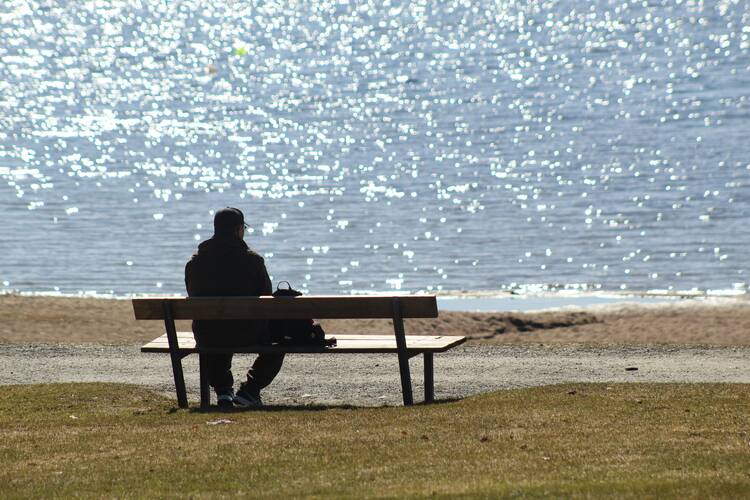The Difficult but Happy Choice to Stay
After five Sundays in a row, the bread of life discourse from the Gospel of John reaches its anticlimactic close. Some of Jesus’ disciples have become disillusioned with their chosen charismatic teacher. Is it possible that Jesus’ nearest disciples would also like to walk away?
“Do you also want to leave?” (Jn 6:67).
Master, to whom shall we go? You have the words of eternal life (Jn 6:68).
Can you recall a critical testing moment in your faith journey?
Are you being called into a deeper trust with Christ?
What might Jesus’ words of eternal life mean for your community?
The build-up from John, Chapter 6, reflects the heightened expectations for this chosen, anointed one. In the opening of John’s Gospel, Jesus is introduced as the light that shines in the darkness, who delivers the “light for the human race” (Jn 1:4). Now, after five Sundays with the meditation that he is the bread of life come down from heaven, the conclusion is sobering: “As a result of this, many of his disciples returned to their former way of life and no longer accompanied him” (Jn 6:65-66). What has arrived is a critical testing moment for discipleship. Jesus’ closest disciples, called the Twelve in today’s passage, now must dig deeper to understand what this new path actually involves besides a miraculous feeding and a teaching about the bread of life.
This element of choice is also reflected in today’s first reading. Joshua, leading the people after Moses, has arrived at his own moment of passing. Joshua gathered the tribes of Israel together, all twelve of them, and presented a choice: “If it does not please you to serve the Lord, decide today whom you will serve.... As for me and my household, we will serve the Lord” (Jos 24:15). Their collective memory recalled all the ways God has been involved in their journey up to the present: The Lord brought us out of a state of slavery; performed great miracles before our eyes; protected us along the entire journey (Jos 24:17-18). With this divine confirmation, all the tribes can respond to Joshua’s question in the affirmative, “We also will serve the Lord, for he is our God.”
The happy outcome above does not play out in today’s Gospel passage. Some disciples walk away and return to their former way of life. They leave Jesus behind. It is as if the call to trust in the bread of life discourse is also a call to radical abandonment of one’s will and even personal safety. Somehow the bread of life come down from heaven can provide eternal life because it passes through the giving of one’s life completely. There is a real cost to discipleship, just as there exists a real promise of nourishment from Jesus. Jesus is flesh and blood, but also spirit and life. Everything, however, passes through a sacrificial lens.
The other readings from this Sunday provide hidden keys to this line of thought. When Paul encourages wives to be subordinate to their husbands, he is building an analogy of bride and groom as that of church and Christ. The obedience of the wife is matched by the full sacrifice of the husband. “Husbands, love your wives, even as Christ loved the church and handed himself over for her to sanctify her” (Eph 5:25-26). Each instance, within these often-misused verses of Scripture, uses the Greek word agape, the well-known sacrificial type of love. Spouses are to give their all to each other as Christ gives up his life for all for the good of eternal life. This too is meant to tie into the bread of life discourse in that eternal life given is somehow always a sacrificial type of love given, broken and received. Psalm 34, recited for the past three Sundays in a row, sings about how God responds to the crushed of the world, the poor, those with little to nothing. “The Lord is close to the brokenhearted; and those who are crushed in spirit he saves” (Ps 34:19).
This sacrificial point of view, which the crushed of the world understand all too well, is hard to accept. Could this be a kind of spiritual wall some disciples of Jesus cannot see through and, therefore, walk away? The powerful witness at the end of today’s Gospel by the Twelve, the fact that they stay with their teacher and Lord, is tied to a certain kind of poverty as expressed in today’s psalm. They have nothing, except that they also have everything in their following of Jesus. Peter, speaking for the rest who stayed, replies to Jesus: “Master, to whom shall we go? You have the words of eternal life. We have come to believe” (Jn 6:68-69).








